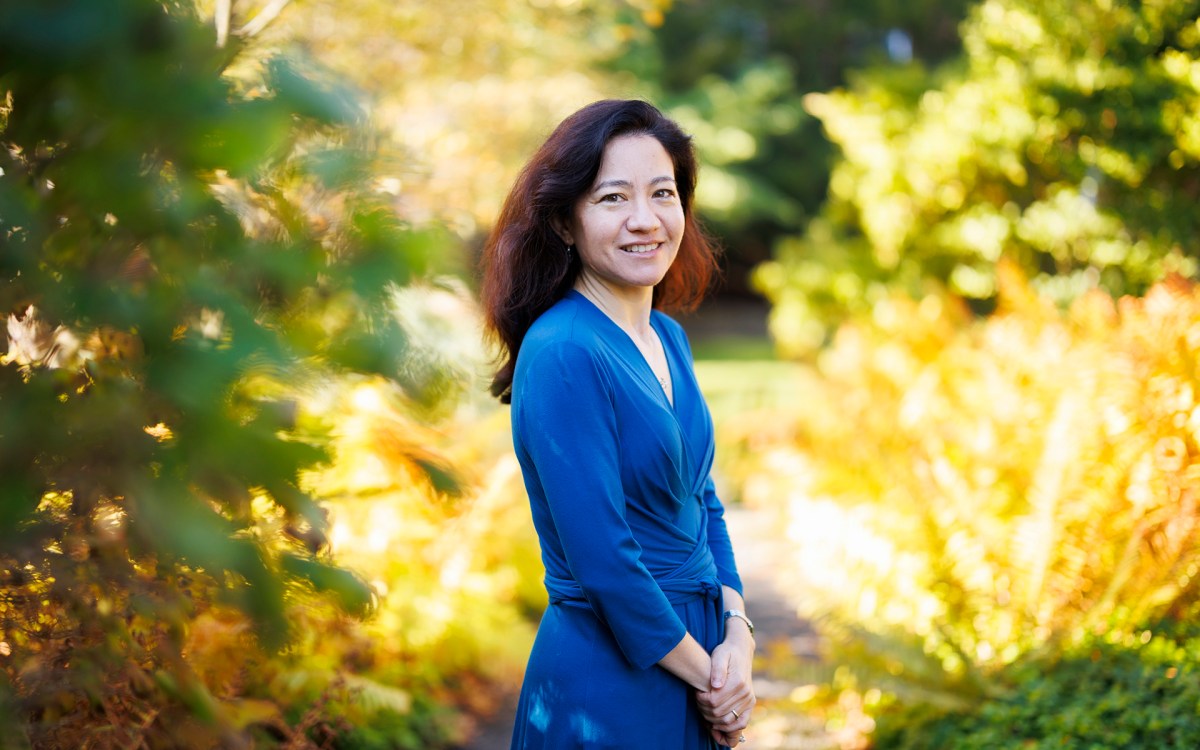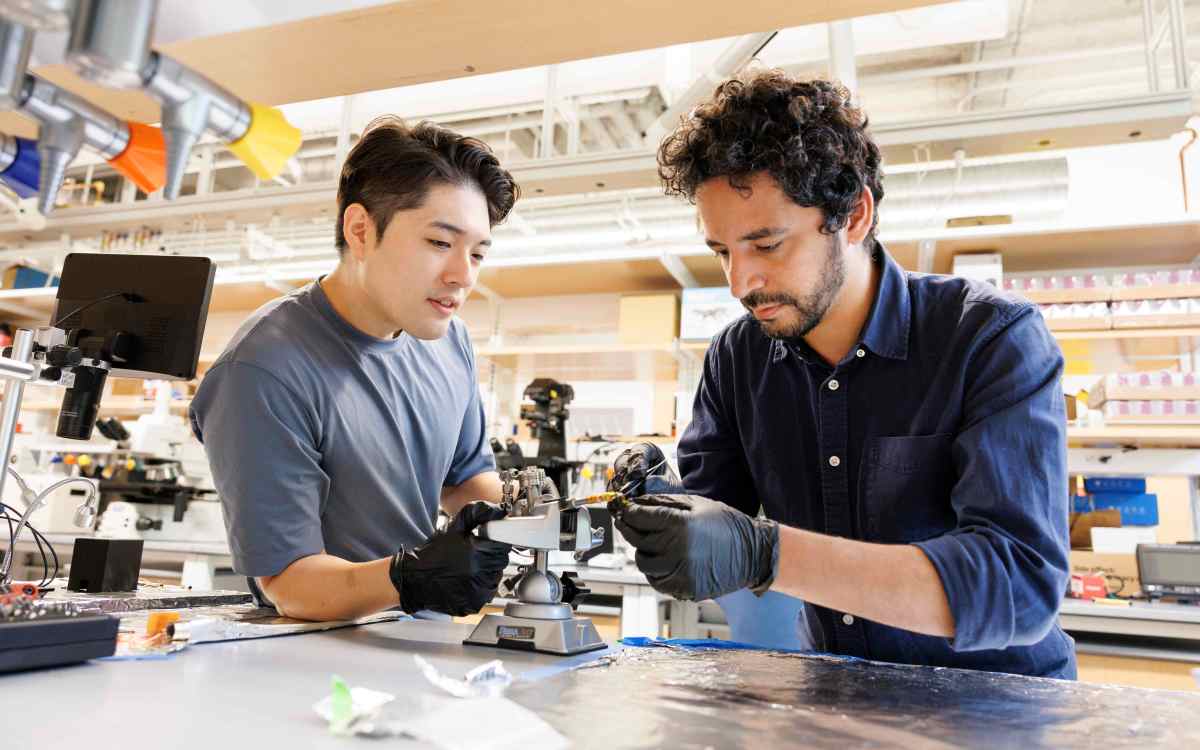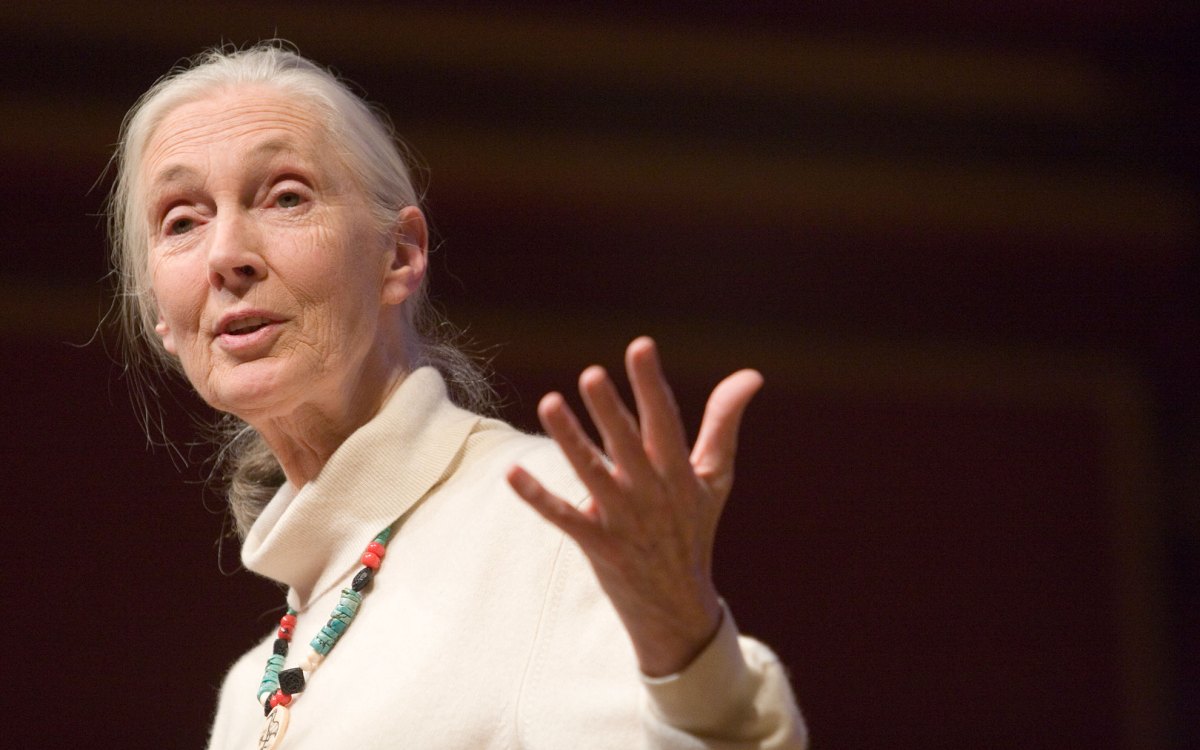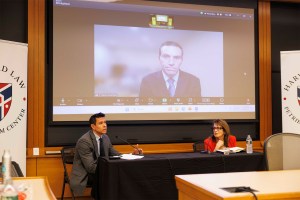Science & Tech
-

Harsh past might bare its teeth
Early adversity leads to higher aggression and fearfulness in adult canines, study says

-

What will AI mean for humanity?
Scholars from range of disciplines see red flags, possibilities ahead
-

‘Human exceptionalism is at the root of the ecological crisis’
Saving the planet requires getting over ourselves, argues author of ‘The Arrogant Ape’
-

Lauren Williams awarded MacArthur ‘genius grant’
Math professor honored for theoretical breakthroughs with sometimes surprising applications across phenomena such as tsunamis, traffic
-

-

‘She had a sense of caring for everybody that she encountered.’
Richard Wrangham remembers his teacher and colleague Jane Goodall as a force of science, empathy, and hope
-
Radcliffe conference presents research on lethal school violence
Educators, policy-makers, law enforcement officials, and adolescent-development specialists came to the Radcliffe Institute for Advanced Study on May 21, 2002, for the National Conference on Lethal School Violence. The conference…
-
Pendulating “between euphoria and despair”
In his landmark 1845 essay, “Facundo, Civilización y Barbarie,” Argentinean author and statesman Domingo F. Sarmiento, the nation’s second president, sharply contrasted the forces at work on his young nation.…
-
Emergency communications
As almost 60,000 federal, state and local public safety agencies plan to upgrade their communications systems in the wake of 9/11, Kennedy School of Government Assistant Professor of Public Policy…
-
Race, place, and segregation
Researchers for the Civil Rights Project at Harvard University, using U.S. census data from 2000, examined whether three major metropolitan areas — Boston, Chicago and San Diego — continue to…
-
Culprit caught in gamma-ray burst mystery
Gamma-ray bursts have long puzzled astronomers. “The hunt for the source of gamma-ray bursts has been a detective story as challenging as any faced by the famous Lieutenant Columbo. We…
-
New online approach builds community around medical cases
A new suite of Internet tools is boosting student-faculty interaction in an engrossing twist on traditional case-based teaching at Harvard Medical School. Called ICON, for “interactive case-based online network,” the…
-
New approach to cervical cancer screening could save lives
When caught early through a Pap test, cervical cancer is almost 100 percent preventable, with treatment of precancers. Compared with current practice, shifting women currently getting annual conventional Pap tests…
-
Americans don’t see obesity as serious health problem
Using unique survey data that they collected, researchers Taeku Lee and J. Eric Oliver presented the first examination of public attitudes towards obesity and obesity policy. They found that, contrary…
-
Black, Latino children with asthma receive lesser standard of care
Led by Tracy Lieu, associate professor of ambulatory care and prevention at Harvard Pilgrim Health Care and Harvard Medical School, the researchers interviewed parents of children with asthma who were…
-
Mexican-American women navigate school and work more successfully than men
Only 19 percent of Mexican-American men in 1990 were upwardly mobile professionally, compared to 31 percent of women, and only nine percent of men worked in professional/technical jobs, compared to…
-
Bad dental health could affect military readiness
Phillip Dexter Woods is a dentist and an Army reservist. Until he graduated in June 2002, Woods was also a student in a master’s program at the Harvard School of…
-
New type of matter may have been found
In orbit around Earth, a satellite called the Chandra X-ray Observatory surveys the universe for sources of X-rays. Using Chandra, a scientist at the Harvard-Smithsonian Center for Astrophysics has observed…
-
Physicians who are experts on managed care avoid enrolling in HMOs
Researchers from the Harvard School of Public Health and RAND surveyed 279 professors at 17 universities across the country who were prominent experts in managed care to find out their…
-
Your community may be harmful to your health
In 1996 the Harvard Center for Cancer Prevention reported that 50 percent of all cancer risk could be eliminated though a modified diet, increased exercise, limited alcohol intake and cessation…
-
School of Public Health tests new emergency management software
CAMEO (Computer-Aided Management of Emergency Operations) is a suite of software programs used by professionals such as emergency management agency specialists, firefighters, hazardous materials teams, industrial hygienists and emergency department…
-
Psychology professor Mahzarin Banaji probes prejudices we won’t admit
From the classroom to the cocktail party, opinions like “men are better at math,” “Asians make the best violinists,” or “women cannot be strong corporate leaders” are unpopular. Yet, says…
-
When worlds collide
Astronomers believe the a mega-merger in the galaxy known as Arp 220 triggered the formation of huge numbers of new stars, sent shock waves rumbling through intergalactic space, and could…
-
American females at highest risk for murder
A female in the United States is three times more likely to be murdered than a female in Canada, five times more likely to be murdered than a female in…
-
New earthquake mapping system could save lives
“The earthquake-hazard maps currently in use are based on the premise that the closer a building is to a large fault, the better designed it should be,” says Harvard earthquake…
-
Binge drinking holds steady
About 44 percent of college undergraduates reported binge drinking at least once in the two weeks prior to being surveyed, according to findings in the 2001 College Alcohol Study, whose…
-
Nanowire used to sense cancer marker
Professor Charles Lieber and his students have made wires whose thinness is measured in atoms instead of fractions of an inch. That allowed Lieber’s team to develop what is likely…
-
Jungle ordeal leads to surprise treasure
William Saturno was hot, frustrated, low on food, low on water, and low on patience when he sought shade in a trench dug by looters at the San Bartolo archaeological…
-
Scientists predict calmer weather ahead
When the Sun is more active, it has bad effects on our planet. For instance, energy from solar eruptions changes the orbits of satellites, causing them to spiral back to…
-
Mustard shows backbone in its own defense
Over the past few years, accumulated evidence from many scientists suggests that plants, animals, and insects share common elements in their innate skirmishes with potential pathogens. In the Feb. 28,…
-
Even stars use sunscreen!
Mira variable stars are named after the red giant star Mira (omicron Ceti) in the constellation Cetus the Whale. Variable stars brighten, then dim, then brighten again. While astronomers have…
-
Pollen production — and allergies — may rise significantly over next 50 years
Ragweed, which flourishes along roadsides and in disturbed habitats throughout North America, produces one of the most common allergens. A study by Harvard researchers found that ragweed grown in an…
-
State of U.S. public health drinking water reliable
“Over the last century, the U.S. has set the world standard for ensuring a reliable, relatively safe drinking water supply to the general public,” said Ronnie B. Levin, a research…
-
Direct-to-consumer advertising of prescription drugs grows rapidly
In the first analysis of patterns of direct-to-consumer advertising before and after 1997 guidelines issued by the Food and Drug Administration, researchers at the Harvard School of Public Health, Harvard…
-
Physicians warn of nuclear terrorist threat
In a new study, Lachlan Forrow, director of ethics support services at Beth Israel Deaconess Medical Center and associate professor of medicine at Harvard Medical School. and his co-authors used…
-
Genetic computation tells man from microbe
By one estimate (based on bacteria counts in the colon or stool samples), microbes that call our bodies home outnumber human cells 10 to 1. Most of the bacteria, viruses,…


